Honorary Doctorate: What It Means and Recent Highlights
If you’ve ever seen a headline like “University awards honorary doctorate to …”, you might wonder what the fuss is about. An honorary doctorate is a special degree given by a university to someone who didn’t go through the normal study route but has made a big impact in a field, community, or society at large. It’s not a regular academic credential – you can’t use it to claim you’ve studied for it – but it carries a lot of respect and can open doors for the recipient.
Why do schools hand out these titles? First, it’s a way to celebrate achievements that align with the institution’s values. Whether it’s a scientist who invented a life‑saving technology, an artist who reshaped culture, or a business leader who created jobs, the university gets to showcase its connection to real‑world success. Second, the ceremony brings publicity. Media outlets love a story about a famous person walking across the stage, and that buzz raises the school’s profile. Finally, it often builds a network. Honorees may later donate, mentor students, or collaborate on research, turning a one‑time award into a lasting partnership.
Why universities give honorary doctorates
Most schools have a committee that vets candidates, checks their track record, and makes sure the honor matches the university’s mission. The process can take months, with input from faculty, alumni, and sometimes even students. When the decision is final, the ceremony usually includes a short speech from the recipient, highlighting how their work relates to the school’s goals. This moment is both a celebration and a reminder that learning happens outside the classroom, too.
One common criticism is that honorary degrees can feel like political hand‑outs. That’s why many institutions set clear criteria: the nominee must have shown excellence over many years, contributed to public good, and have a reputation for integrity. Transparency helps keep the award credible and ensures the public sees it as a genuine tribute rather than a favor.
Recent honorary doctorate stories you should know
In the past year, a South African university awarded an honorary doctorate to a veteran anti‑apartheid activist who spent decades mentoring young leaders. The ceremony was streamed live, drawing thousands of viewers and sparking conversations about social justice on campus. Another notable example came from a tech institute that honored a startup founder whose AI platform has cut energy consumption in factories by 30 %. The founder used the platform to showcase how innovation can tackle climate change, aligning perfectly with the school’s sustainability agenda.
Even sports figures join the list. A major university recently gave an honorary doctorate to a former soccer star who now runs a foundation supporting youth sports in under‑privileged areas. The recipient spoke about how the award fuels his mission to give kids access to safe playing fields and quality coaching. These stories illustrate the wide range of fields that can earn an honorary doctorate – from activism and science to entrepreneurship and sports.
What does this mean for you, the reader? If you’re a student, keep an eye on these ceremonies – they often include networking opportunities, scholarships, or mentorship programs linked to the honoree’s work. If you’re a professional, being recognized by a university can boost your credibility and open doors to speaking gigs or board positions. And if you’re just curious, the stories give a snapshot of who’s making a difference right now and how institutions celebrate that impact.
So the next time you see a headline about an honorary doctorate, remember it’s more than a fancy title. It’s a bridge between academia and the real world, a way to honor real achievement, and a signal of future collaboration. Stay tuned to Cape Sun News for more updates on who’s getting honored and why it matters.
Guardiola hails Manchester City’s ‘beyond extraordinary’ Gaza solidarity
During his honorary doctorate ceremony, Pep Guardiola praised Manchester City’s support for Gaza children, calling it 'beyond extraordinary.' The Manchester boss linked the club’s aid work to a broader call for compassion, highlighting recent donations and community projects. His remarks sparked renewed debate on football’s role in humanitarian crises.

